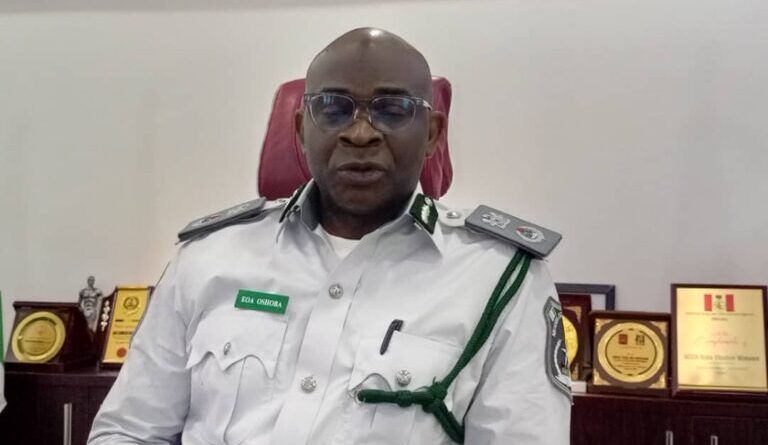Apapa Customs Boss Assures Importers of Rapid Clearance: 200 Containers to Be Processed Within an Hour via New Scanner Drive
By Raheem Ibrahim
The Customs Area Controller of Apapa Port Command, Comptroller Emmanuel Oshoba, has revealed his command’s readiness to clear up to 200 containers within one hour through the new scanner technology initiative, eliminating unnecessary delays in cargo processing.
Oshoba disclosed this during an exclusive interview with Ismail Aniemu, where he discussed the command’s new strategies and his plans to enhance trade facilitation at Nigeria’s busiest port.
According to him, his approach is rooted in leveraging institutional experience and understanding the human dynamics within the port ecosystem.
Introducing himself, Oshoba said: “My name is Controller Emmanuel Oluwadare Abisayo Oshoba. I joined the Nigeria Customs Service in 1991 and have held several positions. At the Controller level, I’ve served as Controller, Risk Management, at the Headquarters; Controller, Special Duties; and most recently, Controller, Customs Intelligence Unit (CIU), from where I assumed office here as CAC, Apapa Area Command.”
When asked about his experience so far at Apapa — the flagship command of the Nigeria Customs Service and the busiest port in West and Central Africa — Oshoba expressed gratitude and determination.
“Firstly, I thank God for my posting here, and I appreciate the Comptroller General of Customs, Bashir Adewale Adeniyi, for his trust in appointing me at this crucial time. My background in Customs Intelligence has equipped me with extensive knowledge of operations nationwide — in revenue, enforcement, and excise,” he explained.
He added that familiarity with his principal officers, including the DCs of Revenue, CIU, Compliance, Valuation, and others, made it easy for him to settle into the command seamlessly.
“Knowing my personnel and having prior relationships with stakeholders made integration smooth. Many of the major stakeholders here are people I’ve interacted with during my previous roles,” he said.
On revenue performance, Oshoba credited his predecessors for laying a strong foundation.
“Albert Einstein once said he stood on the shoulders of those who came before him. Likewise, my predecessors prepared the ground in terms of revenue generation. All I needed was fine-tuning. I also thank God for the business-friendly environment created by President Bola Ahmed Tinubu, who has simplified trade and eased the movement of goods,” he said.
Oshoba noted that his positive reputation from CIU and his officers’ confidence in his leadership have also contributed to improved revenue figures.
The Apapa Customs boss emphasized collaboration and stakeholder synergy as part of the CGC’s three-point agenda: Consolidation, Collaboration, and Innovation.
“Immediately I assumed office, I began stakeholder engagements — meeting traditional rulers like the Oba of Lagos and the Ojora of Ijora, as well as the maritime police, NAGAFF, ANLCA, freight forwarders, and other port users. My previous experience with these groups helped foster trust built on discipline and integrity,” he explained.
Highlighting new innovations under the CGC’s leadership, Oshoba said Customs is embracing advanced technologies to enhance efficiency.
“We’ve introduced Advanced Ruling, which allows importers to seek binding clarification on consignments before arrival. We also have the Authorized Economic Operators (AEO) Scheme, which facilitates trade for compliant importers,” he stated.
He revealed that the command is on the verge of deploying new pass-through scanner machines, expected to process between 150 and 200 containers per hour, significantly reducing inspection time.
“This technology will transform business operations at Apapa Port. We expect the CGC, and possibly representatives from the Presidency, to commission the project soon,” he added.
Oshoba urged port users to prepare for this development by aligning with Customs’ innovation-driven reforms.
Clarifying export responsibilities, Oshoba explained that Apapa Port now functions mainly as a transit point for export goods.
“Export operations are now handled by the Lilypond Export Command. Here, we only manage exports passing through to the ports and vessels,” he stated.
Comptroller Oshoba reaffirmed his commitment to a transparent, technology-driven, and stakeholder-inclusive customs operation.
“As the CGC always says, Customs is open for business. Stakeholder engagement remains key because coordinated border management requires synergy. Increased trade volume translates to higher national revenue, supporting infrastructure development across the country,” he concluded.




